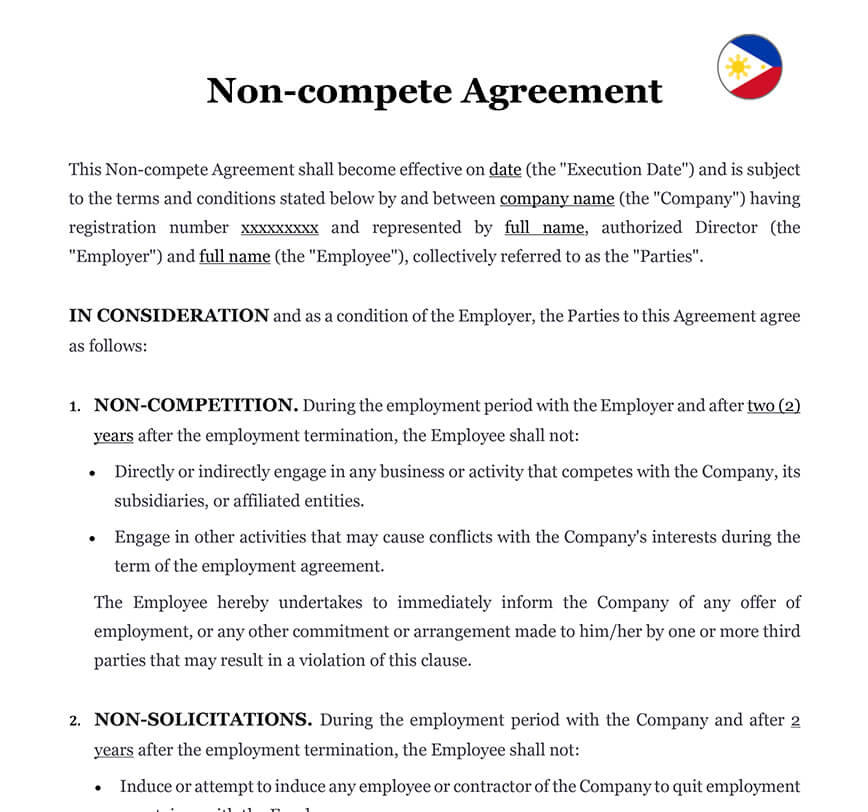
A Non-compete Agreement restricts employees from working for or starting up a competing business. They also protect information such as processes, client lists and marketing strategies.

Word Document (.docx)

Ready to use legal template
Drafted by experienced lawyers
Compliant with Filipino law
Ready to use legal template
Drafted by lawyers
Compliant with Filipino law
Home › Employees › Employee non-compete agreement
Employers in the Philippines may use Non-Compete Agreements as a way to protect their business interests and prevent former employees from sharing confidential information or starting a competing business. These agreements typically restrict employees from engaging in business activities that are similar to their employer’s for a certain period of time after their employment ends. By using Non-Compete Agreements, employers can safeguard their Intellectual Property, trade secrets, and client relationships, which can be crucial to their success in the competitive Philippine market.
An Employee Non-Compete Agreement in the Philippines is a legally binding contract between an employer and an employee that restricts the employee from engaging in certain business activities that compete with the employer’s interests. Non-Compete Agreements in the Philippines limit an employee’s ability to work for a competitor or start a competing business for a certain period of time after their employment ends. The purpose of such an agreement is to protect the employer’s trade secrets, confidential information, and customer relationships, as well as to prevent the employee from benefiting from the knowledge and skills gained during their employment. However, Philippine Labor Laws require that Non-Compete Agreements be reasonable and not overly restrictive, taking into account the employee’s right to work and earn a living.
An Employee Non-Compete Agreement in the Philippines may be used in a variety of situations, such as:
1. When an employer wants to protect its confidential information and trade secrets, such as customer lists, business strategies, or product designs, from being used by a former employee to compete with the employer’s business.
2. When an employer invests significant time and resources in training an employee, and wants to prevent the employee from taking that knowledge to a competitor or starting a competing business.
3. When an employer has a unique product or service that is crucial to its business and wants to prevent a former employee from starting a competing business in the same field.
4. When an employer has a unique product or service that is crucial to its business and wants to prevent a former employee from starting a competing business in the same field.
You can also download a Employee Confidentiality Agreement if you want to protect company’s trade secrets, proprietary information, and intellectual property from unauthorized disclosure.
Non-Compete Agreements are generally enforceable in the Philippines, but there are certain legal requirements that must be met for them to be valid and enforceable. Under Philippine law, Non-Compete Agreements must be:
1. In writing: Non-Compete Agreements must be in writing and signed by the employer and employee to be enforceable.
2. Reasonable: Non-Compete Agreements must be reasonable in terms of scope, duration, and geographic coverage. They should not be overly restrictive and must be proportionate to the employer’s legitimate business interests.
3. Supported by consideration: Non-Compete Agreements must be supported by consideration, such as payment of additional compensation or providing access to specialized training or trade secrets.
4. Not against public policy: Non-Compete Agreements must not be against public policy or the employee’s right to work and earn a living.
5. Confined to legitimate interests: Non-Compete Agreements must be confined to the legitimate interests of the employer, such as protecting trade secrets or confidential information.
If a Non-Compete Agreement meets these legal requirements, it is generally enforceable in the Philippines. However, if the agreement is found to be unreasonable or contrary to public policy, it may not be enforceable, and the employee may be free to engage in competing business activities.